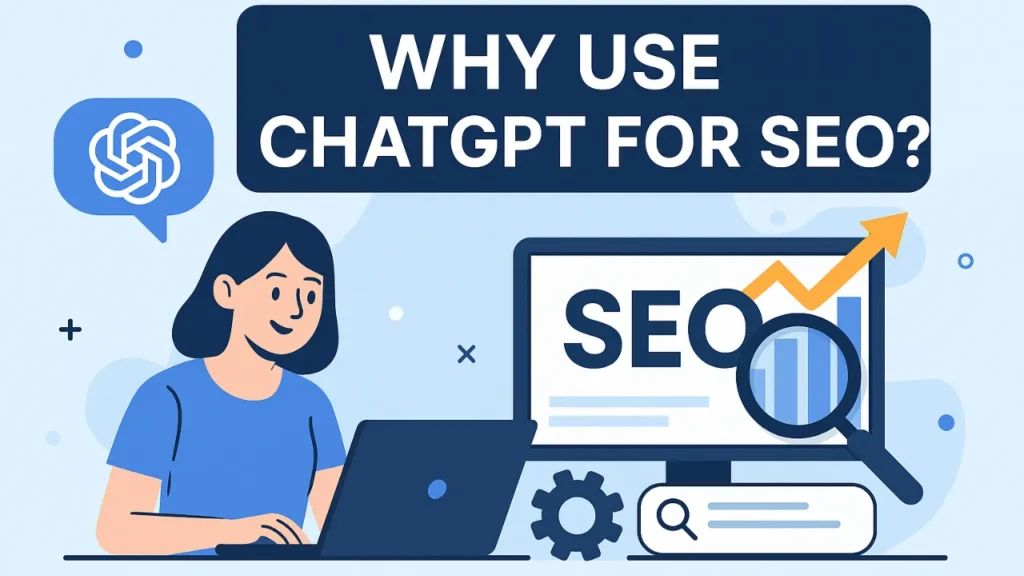Want to skyrocket your website traffic without spending a dime on ads?
These 50 Smart SEO Prompts for ChatGPT are designed just for that.
How can you use AI to dominate Google rankings and grow your online presence fast?
You may discover prompts tailored for keyword research, on-page SEO, content ideas, and meta tag generation. Each one is crafted to help ChatGPT generate traffic-focused content with precision. From niche blog posts to high-converting landing pages, these prompts cover every SEO angle.
Brian Dean and Neil Patel often stress the value of quality prompts when using AI for content marketing.
Ready to transform your ChatGPT sessions into traffic machines?
We are going to dive into the complete list and unlock your site’s growth potential.
To avoid AI detection, use Undetectable AI. It can do it in a single click.
Table of Contents
Why Use ChatGPT for SEO?

ChatGPT can save time and resources that could be used for strategic endeavors by automating repetitive SEO tasks such as content outlining, meta description creation, and keyword research. In addition to suggesting related terms and search intents, ChatGPT can assist in creating a list of keywords for content creation.
ChatGPT can improve the visibility and usability of content by assisting with content drafting, creating meta descriptions, and even suggesting schema markup. ChatGPT can make the process efficient by assisting with tasks such as creating outreach emails and building backlinks.
Read Also >>> Why Gemini is the Best AI for Summarizing YouTube Videos in 2025?
SEO experts can stay ahead of the curve and adjust to changes in search engine algorithms by incorporating ChatGPT as AI develops further.
The Way ChatGPT Uses SEO Prompts
Creating compelling prompts that direct the AI to produce the intended outputs is the cornerstone of using ChatGPT for SEO. According to Backlinko, prompts can be used to analyze search intent, find high-volume, low-competition keywords, and generate keyword ideas.
According to Writesonic, ChatGPT can be used to create blog entries, articles, and other types of content. According to Surfer SEO, ChatGPT can help create structured data for sitemaps, robots.txt directives, and rich snippets, making technical SEO procedures easier.
According to Writesonic, ChatGPT can be used to create customized outreach emails and find possible link partners.
Best Practices Before Using SEO Prompts with ChatGPT
- Create prompts that specify the SEO task precisely. Provide ChatGPT pertinent background data, such as the website’s industry, target audience, or content that already exists.
- Provide specific instructions to ChatGPT regarding the output’s format, such as the length of the title, the positioning of the keywords, or the use of structured data markup.
- To direct ChatGPT’s output, incorporate information from search analytics, competitor analysis, and keyword research resources.
- The output of ChatGPT might require improvement. To address particular problems, such as filling in the blanks, making the text easier to read, or adjusting the tone, use follow-up prompts.
- If you are using AI-generated content, inform your audience about it. Don’t depend on ChatGPT’s output alone. Verify and revise the content frequently to check that it is accurate, pertinent, and consistent with your brand voice.
- For a thorough approach, combine ChatGPT’s features with those of other SEO resources, such as analytics dashboards, content analysis resources, and keyword research platforms.
50 Smart SEO Prompts for ChatGPT to Boost Traffic

Using the right prompts with ChatGPT can help you create SEO-rich content, optimize existing posts, and drive traffic to your website.
Here are 50 SEO prompts, categorized for different SEO tasks:
Prompts for Blog Post Creation
- Write a detailed blog post on \[keyword] optimized for SEO.
- Create a blog post outline for \[topic] targeting \[keyword].
- Write an introduction for a blog titled ‘\[title]’ with SEO optimization.
- Expand this blog section on \[subtopic] with SEO-rich content.
- Suggest blog post ideas related to \[main keyword] with high search volume.
- Write a conclusion that encourages engagement and includes relevant keywords.
Prompts for Keyword Research & Optimization
- List long-tail keywords related to \[topic] with high traffic potential.
- What are the LSI (latent semantic indexing) keywords for \[main keyword]?
- Suggest keyword clusters for \[main keyword] to improve topical authority.
- Analyze these keywords for search intent: \[list keywords].
- Create a keyword map for a blog on \[topic].
Prompts for Meta Titles & Descriptions
- Write an SEO-friendly meta title for a post about \[topic] under 60 characters.
- Generate a compelling meta description for \[topic] under 155 characters.
- Suggest 3 variations of meta titles for the keyword \[keyword].
- Create meta titles and descriptions that target both search engines and clicks.
Prompts for Content Structure & Headings
Generate SEO-optimized H1, H2, and H3 headings for a post on \[topic].
Structure a blog post on \[keyword] to rank for featured snippets.
Break this paragraph into SEO-friendly sections with subheadings.
Create a content brief for \[topic] with SEO-focused headings and word count.
Prompts for Featured Snippets & FAQs
- Write a definition of \[term] in under 50 words to target a featured snippet.
- Generate a how-to answer for \[question] to appear in Google’s snippet box.
- List 5 FAQ questions and answers related to \[keyword] for SEO.
- Summarize \[topic] in a bulleted list to target Google snippets.
Prompts for Competitor Analysis
- Analyze the top 3 search SERPS for \[keyword] and list common content patterns.
- Summarize SEO strategies used by competitors ranking for \[topic].
- What are the content gaps in \[competitor site] about \[keyword]?
- Generate unique angles for writing about \[topic] not covered by competitors.
Prompts for Content Updating & Republishing
- Suggest ways to update this outdated blog post on \[topic] for 2025 SEO.
- Identify SEO opportunities in this blog post: \[insert paragraph].
- Rewrite this blog section using more relevant keywords and updated info.
- Refresh the introduction and conclusion of this post to boost engagement.
Prompts for Internal Linking & Content Planning
- List related blog post ideas I can internally link to from an article on \[keyword].
- Create an internal linking strategy for a website focused on \[niche].
- Generate a content calendar using SEO keywords around \[main topic].
- Cluster these topics into pillar and subtopic content: \[list of blog ideas].
Prompts for On-Page SEO Optimization
- Check this paragraph for keyword stuffing and improve readability.
- Optimize this sentence to include the keyword \[keyword] naturally.
- Improve this content’s Flesch reading score while keeping SEO intact.
- Suggest alt tags for these images based on the blog’s keyword: \[image list].
Prompts for Social Sharing & Engagement
- Write an SEO-optimized Twitter thread summary for this blog post.
- Create a LinkedIn post that promotes this article and includes key SEO terms.
- Write a Pinterest description using keywords for this blog graphic.
- Generate 3 call-to-action (CTA) examples to encourage comments on my blog.
Prompts for Analytics & Performance Review
- Suggest KPIs to track SEO performance for blog posts.
- What SEO metrics should I monitor in Google Search Console?
- Based on my blog stats, what topics are performing best SEO-wise?
Prompts for Local SEO (if applicable)
- Write a local SEO blog post for \[business/service] in \[city].
- Suggest local keywords for a blog targeting \[location] customers.
- Create Google My Business description content using SEO prompts.
Bonus Prompt
Act as an SEO expert. Analyze my blog structure and suggest improvements to boost search traffic.
FAQs: 50 Smart SEO Prompts for ChatGPT to Boost Website Traffic Instantly
What are the benefits of using smart SEO prompts for ChatGPT?
Using smart SEO prompts for ChatGPT can significantly enhance your SEO efforts by providing you with tailored content ideas and strategies. These prompts help in generating high-quality content that is optimized for search engines, promising that you attract organic traffic.
By using AI resources such as ChatGPT, you can unlock new ways to engage your target audience and improve your SEO performance. This not only aids in keyword research but also helps in crafting compelling meta descriptions and optimizing your content for better visibility in search engines.
How can I implement 50 smart SEO prompts into my content strategy?
To implement 50 smart SEO prompts into your content strategy, begin by identifying your target keywords and the interests of your target audience. Use the prompts for ChatGPT to generate ideas for articles, blog posts, and social media content that align with your SEO objectives.
Incorporate relevant long-tail keywords and check that your content adheres to SEO best practices. Regularly update your content based on performance metrics and feedback to maintain continuous SEO optimization.
What types of content can I create using ChatGPT prompts for SEO?
You can create a variety of content using ChatGPT prompts for SEO, including blog posts, articles, FAQs, product descriptions, and social media posts. By using specific prompts, you can focus on generating content that targets specific keywords or addresses common questions from your target audience.
This can also include creating guides, how-Tos, and lists that are designed to improve SEO and drive traffic to your website.
How do smart SEO prompts help with keyword research?
Smart SEO prompts can assist with keyword research by suggesting relevant keywords and phrases that are trending in your industry. When you input a prompt into ChatGPT, it can generate a list of potential keywords that resonate with your content objectives. This can help you discover high-quality keywords that you may not have considered.
Conclusion: 50 Smart SEO Prompts for ChatGPT to Boost Website Traffic Instantly
With these 50 smart SEO prompts for ChatGPT, you are now equipped with dynamic prompts to boost your website traffic, create keyword-rich content, and outperform your competition on search engines.
Which of these 50 SEO prompts are you excited to try on your website?
Drop your thoughts in the comments!


